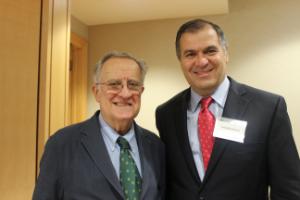A distinguished panel of experts from around America and across Europe spent an enlightening day examining the pending Transatlantic Trade and Investment Partnership between the European Union and the United States. The seminar took place at the University of Miami on Friday, February 28, and was co-sponsored by the European Union Center in UM’s College of Arts & Sciences, the Delegation of the European Union in the United States, and the European Union Studies Association.
The Transatlantic Trade and Investment Partnership (TTIP) is a proposed free-trade agreement between the European Union and the United States. The measure has been discussed in three formal rounds of talks, and is expected to be finalized by the end of 2014.
 Together, the EU and the United States hold 60% of the global GDP, 33% of world trade in goods, and 42% of world trade in services. If ratified, TTIP would represent the largest agreement of its kind in history, and could boost trade between the two blocs by as much as 50%.
Together, the EU and the United States hold 60% of the global GDP, 33% of world trade in goods, and 42% of world trade in services. If ratified, TTIP would represent the largest agreement of its kind in history, and could boost trade between the two blocs by as much as 50%.
TTIP would eliminate trade tariffs and other barriers, increase cooperation among regulatory bodies, bolster intellectual property protection, and create millions of new jobs (particularly in the pharmaceutical, agricultural, and financial services sectors). However, the measure is not without its controversies. For example, genetically modified foods remain a contested issue.
College of Arts & Sciences Dean Leonidas Bachas opened the seminar, stating that the outcomes of the day’s proceedings and TTIP in general will be an important issue for students today and beyond.
“Our goal is to not only educate a new generation of leaders, but to make the world a better place for them,” said Bachas, adding that, as a chemist, he is interested in the scientific possibilities that TTIP will create.
Antonio de Lecea, Minister and Principal Advisor of the Delegation of the European Union in the United States, said that TTIP “is close to the heart of the delegation”.
“The EU and United States have the largest economic relationship in the world, with similar economies and comparable levels of development,” said de Lecea.
de Lecea stated that more than 15 million jobs would be created through TTIP, with about half in the US and half in the EU. “TTIP is intended to cut tariffs and open collaboration,” he said, adding that if no action is taken, “gaps in the multilateral rule book will remain.”
The European Union Center (EU Center) is a joint initiative between the University of Miami and Florida International University, which is funded by the European Union. One of only 10 such institutions in America, the Miami center focuses on transnational relations among the EU, United States, and Latin America.
UM EU Center Director Joaquín Roy is the recipient of a Jean Monnet Chair from the European Education, Audiovisual and Culture Executive Agency; this distinction is given to four professors in the world with a specialization in European integration studies.
Roy will be preparing an edited volume of the seminar proceedings, to be published on May 9, 2014, international Europe Day. It will be presented at the Latin American Studies Association annual conference in late May 2014, in Chicago, IL. Events featuring the publication will follow in Buenos Aires and throughout Europe.
For more information on the EU Center, please visit http://www.as.miami.edu/eucenter/.

